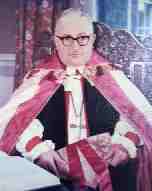Ian Ramsey
|
The Right Reverend Ian Ramsey |
|
|---|---|
| Bishop of Durham | |

Ramsey robed as a bishop
|
|
| Diocese | Diocese of Durham |
| In office | 1966–1972 |
| Predecessor | Maurice Harland |
| Successor | John Habgood |
| Other posts | Chaplain, Christ's College, Cambridge (1943–1949) Nolloth Professor of the Philosophy of the Christian Religion (1951–1966) Chaplain & Sub-Prelate, Order of St John (1969–?) |
| Orders | |
| Ordination | 1940 (deacon) c. 1941 (priest) |
| Consecration | 1 November 1966, York Minster |
| Personal details | |
| Born |
31 January 1915 Kearsley, Lancashire, United Kingdom |
| Died | 6 October 1972 (aged 57) Marylebone, Greater London, UK |
| Buried | Auckland Castle (ashes) |
| Nationality | British |
| Denomination | Anglican |
| Residence | Auckland Castle (as Bishop of Durham) |
| Parents | Arthur & Mary |
| Spouse | Margaret née McKay (m. 1943) |
| Children | 2 sons |
| Profession | scholar: philosophy of religion, science and religion, theology |
| Alma mater | Christ's College, Cambridge |
Ian Thomas Ramsey (31 January 1915 – 6 October 1972) was a British Anglican bishop and academic. He was Professor of the Philosophy of Religion at the University of Oxford, and Bishop of Durham from 1966 until his death in 1972. He wrote extensively on the problem of religious language, Christian ethics, the relationship between science and religion, and Christian apologetics. As a result, he became convinced that a permanent centre was needed for enquiry into these inter-disciplinary areas; and in 1985 the Ian Ramsey Centre for Science and Religion at the University of Oxford was set up to promote discussion on the problems raised for theology and ethics by developments in science, technology and medicine.
Ramsey was born in Kearsley, near Bolton, Lancashire, an area noted for small industries and factories. He was the sole child born to Arthur and Mary Ramsey, and was raised by them in the Christian faith. He attended primary school at St John's Church in Farnworth, Bolton, and then proceeded on a scholarship to Farnworth Grammar School where he studied Latin, mathematics, physics and chemistry. He won a scholarship that enabled him to study at Cambridge University in the 1930s and graduated with an MA in 1940. At Cambridge, he was influenced by Charles E. Raven (Regius Professor of Divinity) and A. C. Ewing. Raven spurred Ramsey's interests in the relationship between science and religion, while Ewing guided him into studying metaphysics.
After graduating from Cambridge, Ramsey then enrolled as candidate for ordination in the Church of England at Ripon Hall, near Oxford, and began his theological studies there. During his studies he served as an assistant curate at Headington Quarry and it was there that he met his wife Margretta McKay (called Margaret; whom he married in 1943). In 1943, upon completing his theological degree and ordination Ramsey then took on the role of Chaplain at Christ's College, Cambridge. He was elected as a Fellow and Director of Studies in theology and moral science in 1944. It was also in 1944 that he was appointed as university lecturer in divinity and Canon Theologian at Leicester Cathedral. He held the latter role alongside his main posts until 1966 when he was elected the Bishop of Durham. His first doctorate was an honorary Doctorate of Divinity (Hon DD) from Oxford, awarded in 1966.
...
Wikipedia
